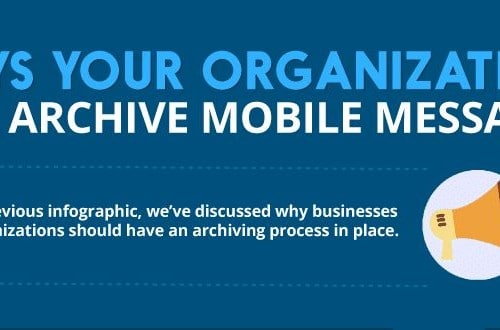Whether you own a small venture or a big enterprise, there are lots of compelling reasons why you should have a text message archiver in place on your business premises.
Not only it is critical to your company’s security and reputation, but archiving text messages is also crucial to making sure you can trace text-based evidence and use it to prove certain cases on the court. And with the data explosion in the recent years, archiving has also come to the forefront as organizations search for a solution that’ll help them maintain and produce diverse types of data without the need to augment their on-premise IT capabilities.
Nowadays, these implications have become much more pronounced since texting, chat apps, and smartphones have become a common part of day-to-day operations of most business across different industries.
To know more about this topic, check out this infographic on text message archiving as we present to you the top reasons why your organization’s archiving text messages is mission-critcal and how to archive text messages

Regulatory Compliance
Almost all industries have some sort of regulatory compliance concerning the need for organizations to retain and produce content. Such regulatory obligations often exist in industries such as:
- • Financial Services
- • Insurance
- • Healthcare
- • Energy
- • Utilities
- • Government
- • Life Sciences
That said, even organizations outside these sectors also have an obligation to retain and manage certain types of data. These regulations obligate organizations to retain information like financial documents, certain types of email correspondence, employee records, and communications with clients – including texts messages and chats.
To give you the bigger perspective, here are a number of regulations that calls for text message archiving:
A. Financial Services Organizations
- • Securities and Exchange Commission (SEC)
- • Financial Industry Regulatory Authority (FINRA)
- • PATRIOT Act and;
- • Gramm-Leach Bliley Act (GLBA)
- • Sarbanes-Oxley Act
- • Dodd-Frank Act
B. Healthcare Organizations
- • HIPAA, HITECH (USA)
- • GDPR (EU)
C. Government
- • Freedom of Information Act
- • Federal Rules of Civil Procedure (FRCP)
- • Federal Information Security Management Act (FISMA)
D. Energy — Federal Energy Regulatory Commission (FERC) Order No. 717.
Supporting Court Case and eDiscovery
Being involved in a legal action of some sort is the last thing that many business owners want to see happen. But in reality, it takes place a lot in the business landscape. Whether as a plaintiff, as a defendant, or as an interested third-party, companies and organizations can rely on archived information such as text messages, in case they need to pursue a legal action or defend themselves in one.
Under the requirements of Federal Rules of Civil Procedure, the organization has the obligation to search and produce electronic content, such as email, files and text messages. This obligation to produce this information might be based on an eDiscovery order from a court, or it can occur when
decision makers become aware of an impending litigation, thus requiring the organization to place a “litigation hold” on data that might be considered relevant for the duration of the potential legal action.
For instance, a claim for breach of contract with a contractor could require the preservation of emails, text messages, and other content between employees and the contractor, or between employees talking about the contract or the contractor’s performance.
With a reliable message archiving platform, an organization will be able to place a hold on data immediately when requested by court, regulator or on the advice of legal counsel, and also allow them to suspend deletion policies and practices, and retain the data for as long as needed.
End-User Self-Service
Aside from regulatory compliance and being a requirement on litigations, another reason why companies must have an archiving process in place is the added benefit it provides to your employees. Archiving allows the people
within your business to access older content without the need to store them on a live server or in the device’s storage.
This capability benefits both the end users and IT department of an organization. The end users will be able to access the content as old as they need, and without having to bother the IT with requests to search for and restore these files. On the other hand, the IT can place a strict limit on mailbox size, thus speeding up the backup and restoration process of servers.
Overall, archiving reduces the cost and time for backup, upgrades, and database tuning that organizations will incur in the long run.
Retention of Corporate Memory
Lastly, having a mobile archiver in your business gives you the ability to retain relevant information to maintain an appropriate record of an organization’s history. As technology changes, ensuring that your communication data will remain secured and retrievable years from now is critically important. With a text message archiver, you
have the assurance that storage methods will not become obsolete since cloud storage is becoming the norm across industries.
We hope that these reasons have made you realize how important text archiving is in today’s business communication landscape. To learn more about how TeleMessage can provide you with mobility solutions and next-generation wireless communication technologies, just visit our website www.telemessage.com






